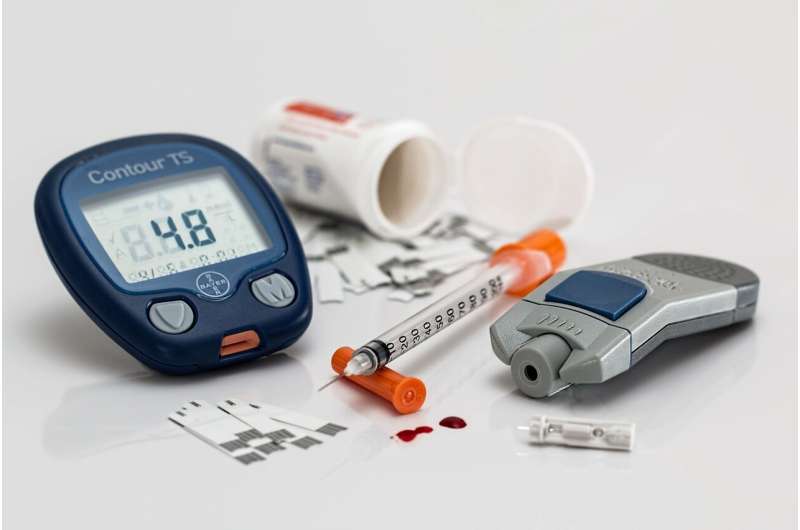
Racial and ethnic inequities in diabetes have been established following gestational diabetes, but these inequities are substantial and have been an overlooked facet of maternal health equity, according to a new study by epidemiologist Teresa Janevic, Ph.D., associate professor of Epidemiology at Columbia University Mailman School of Public Health.
Until now there was limited research on racial and ethnic disparities in type 2 diabetes after gestational diabetes mellitus (GDM). The findings are published online in the journal Obstetrics and Gynecology.
“Very few studies have examined prenatal, social, or structural determinants of type 2 diabetes after GDM,” said Janevic. “Our study has several strengths. It is the largest cohort study to date on racial and ethnic disparities after GDM, allowing us to explore potential pathways to these disparities.”
Gestational diabetes mellitus is diagnosed in about 8% of pregnant people in the U. S. and especially affects underserved communities of color.
The researchers used both the birth and hospital records to define the GDM cohort and to establish covariates, an approach with high validity.
Using 2009–2011 New York City birth and hospital data and 2009–2017 New York City A1c Registry data, the researchers classified type 2 diabetes as two hemoglobin A1c test results of 6.5% or higher. They also estimated associations between race and ethnicity and 8-year type 2 diabetes incidence, with data modeling techniques.
The results showed a fourfold increased risk of type 2 diabetes after gestational diabetes mellitus among Black individuals and a threefold increased risk among Hispanic and South and Southeast Asian individuals relative to White individuals.
The data included 22,338 patients with gestational diabetes. The 8-year type 2 diabetes incidence was 12% overall and 18.5% in Black, 17% in South and Southeast Asian, 15% in Hispanic, and 5.5% in East and Central Asian patients, compared to 5% in White individuals.
Of individuals identified with GDM, 78% had an Hb A1c test during the follow-up period. Among Black and Hispanic individuals, the percentage was 82%, among Asian individuals, 78%, and among White individuals, 68%.
Social, structural, and clinical characteristics at the time of delivery explain 46% of the increased risk of postpartum diabetes among Hispanic people, 27% among Black people and 14% of the increased risk among South/Southeast Asian people, thus creating an opportunity to intervene on life-long cardio-metabolic inequities.
Routinely measured social determinants of health at the time of delivery such as education and insurance status had weaker associations with later diabetes in South Asian, Black, and Hispanic pregnant people than in non-Hispanic White pregnant people, showing the need to learn how structural racism influences postpartum cardiometabolic risk in these groups, according to Janevic and colleagues.
“While racial and ethnic inequities are substantial in type 2 diabetes after GDM, the weak associations we see of common social or structural measures and BMI in Black, Hispanic and South and Southeast Asian individuals demonstrate the need for greater understanding of how structural racism influences postpartum cardiometabolic risk in these groups,” observed Janevic.
Within 8 years after experiencing gestational diabetes in pregnancy, an estimated 1 in 5 Black patients, 1 in 6 South or South Asian patients, 1 in 7 Hispanic patients, and 1 in 20 non-Hispanic White patients will have type 2 diabetes.
Health care during pregnancy is a rare point of care with the health system for many people and, therefore, serves as an opportunity to intervene early to reduce life-course differences in type 2 diabetes, Janevic points out.
“Our findings underscore the opportunity for GDM as an intervention point for life-course type 2 diabetes inequities and stress the importance of racial and ethnic disparities in GDM outcomes beyond the current pregnancy,” said Janevic. “We call for further work using multiple approaches—policy-level changes, along with clinical interventions targeting individuals,—to counter structural racism and to eliminate disparities.”
More information:
Teresa Janevic et al, Racial and Ethnic Inequities in Development of Type 2 Diabetes After Gestational Diabetes Mellitus, Obstetrics and Gynecology (2023). DOI: 10.1097/AOG.0000000000005324
Citation:
Study seeks to explain widespread inequality for developing diabetes mellitus following gestational diabetes (2023, September 7)
retrieved 7 September 2023
from https://medicalxpress.com/news/2023-09-widespread-inequality-diabetes-mellitus-gestational.html
This document is subject to copyright. Apart from any fair dealing for the purpose of private study or research, no
part may be reproduced without the written permission. The content is provided for information purposes only.
Source link




